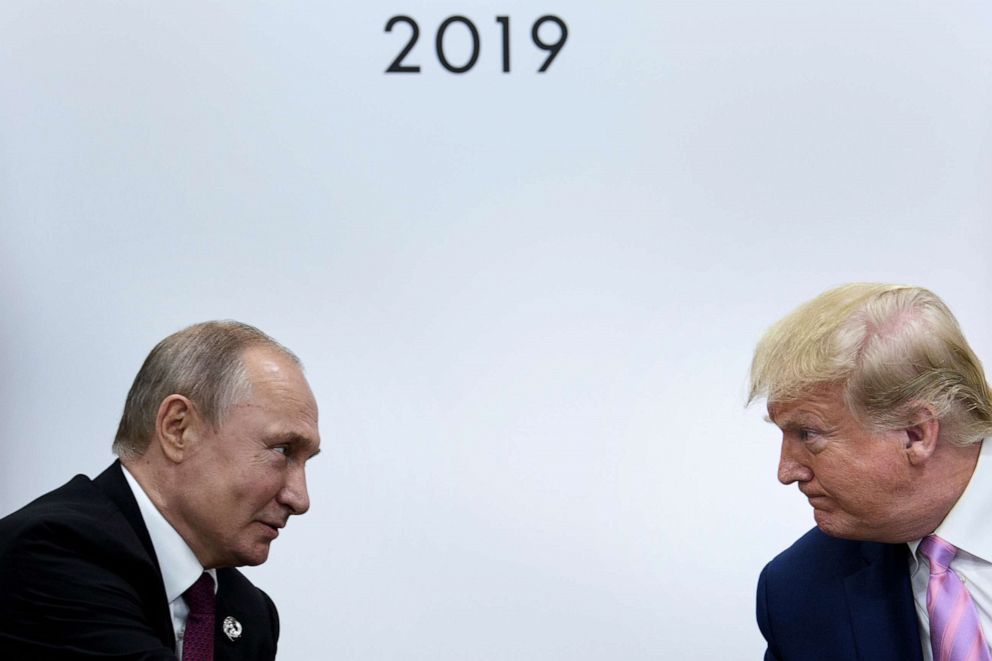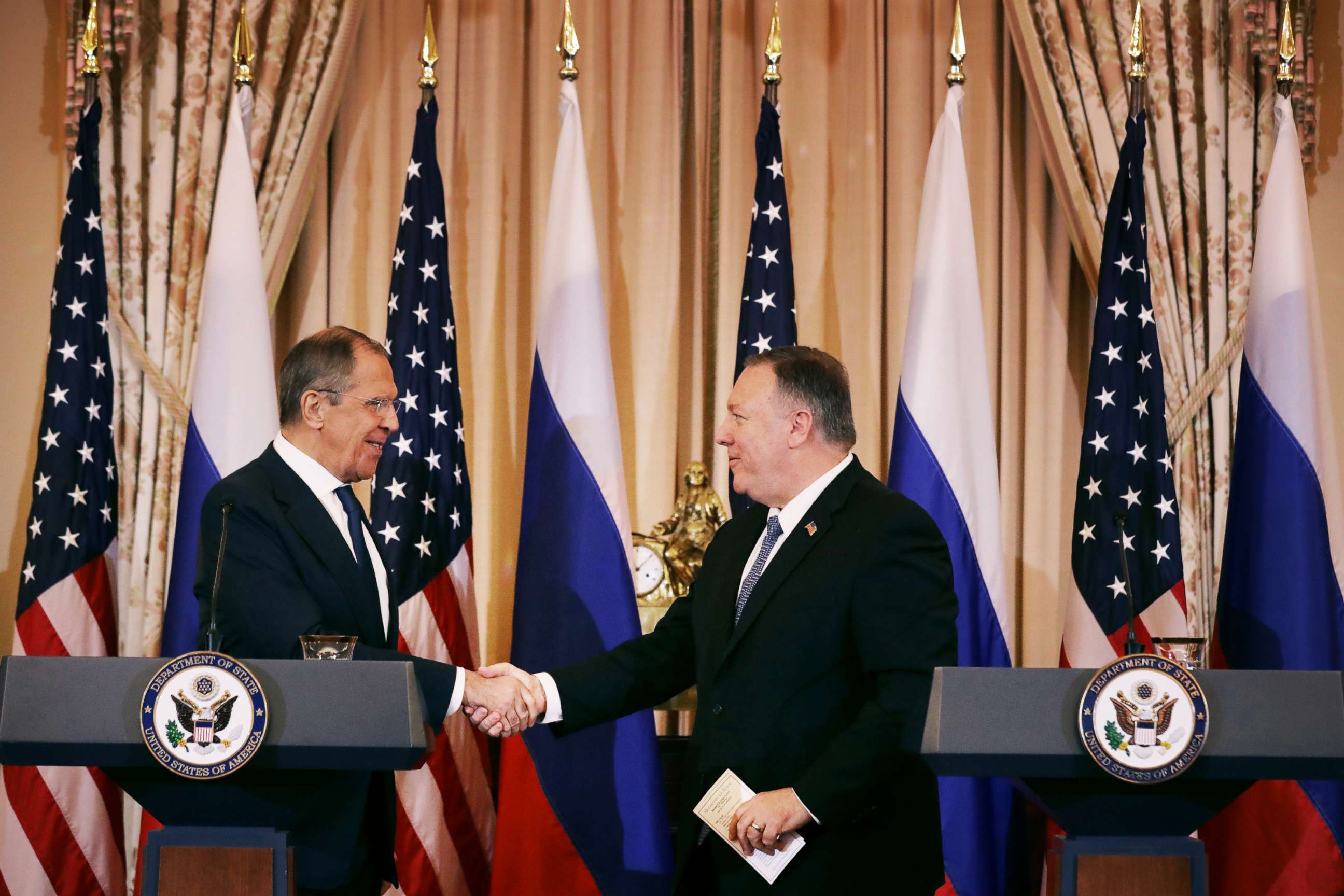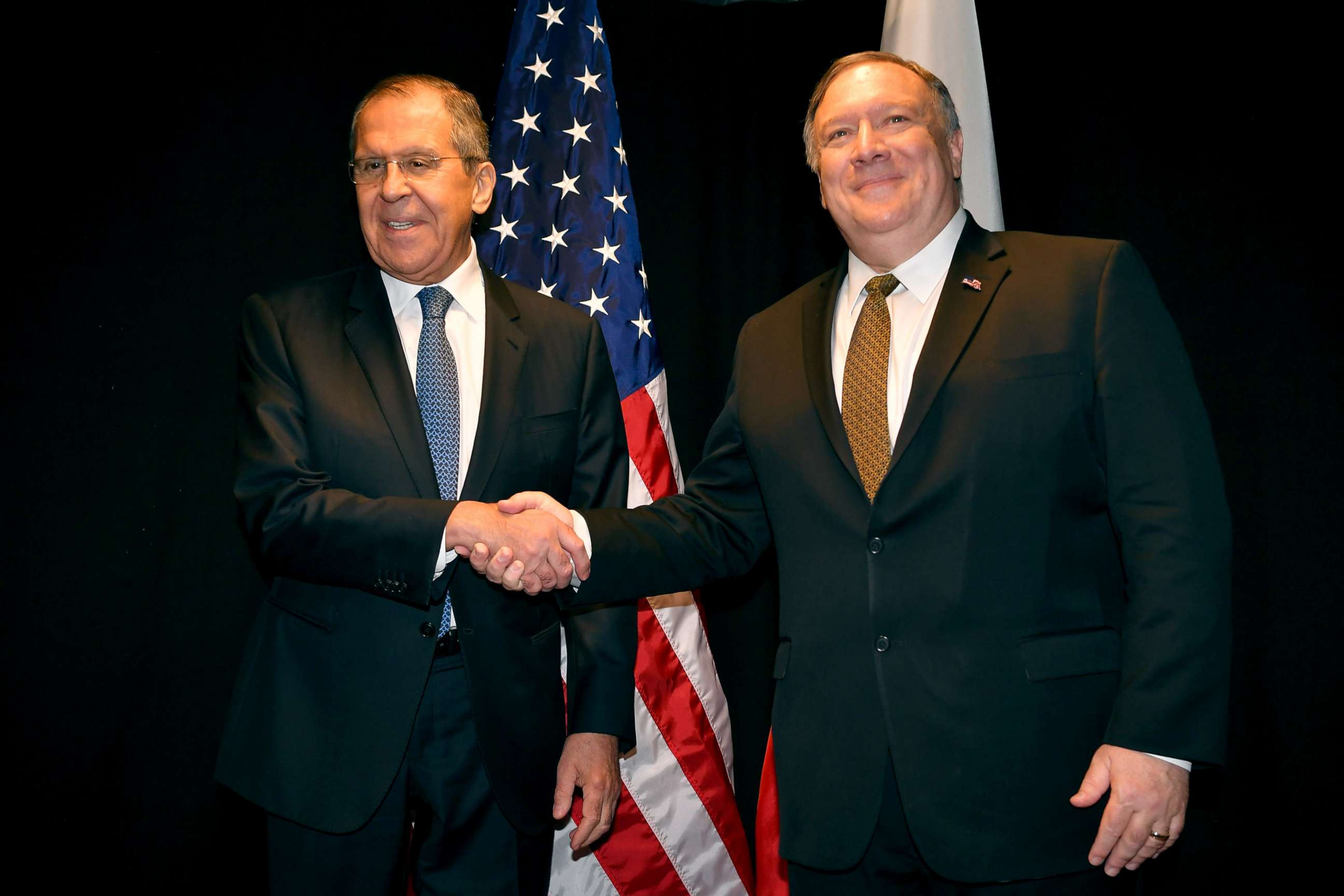Secretary Mike Pompeo says he warned Russia's foreign minister that election meddling is 'unacceptable'
Both top diplomats call for improved relations between the U.S. and Russia.
Secretary of State Mike Pompeo says he warned Russian Foreign Minister Sergei Lavrov about any further Russian interference in U.S. politics during their news conference on Tuesday, even as Lavrov again claimed Russia did not interfere.
Hours later, Lavrov had a White House meeting with President Donald Trump, where the president also warned Lavrov against any Russian interference, according to the White House -- something that Lavrov seemed to deny.
Despite Russian interference in the 2016 presidential race, warnings about potential meddling in the 2020 contest, and its malign activity in Syria, Ukraine, Venezuela, and elsewhere, Trump has consistently called for restoring relations with Moscow.
Both Pompeo and Lavrov said there is now an opportunity to do so, with Pompeo teasing a "significant announcement" on economic ties "in the near future."
But that threat of Russian meddling has hung over the relationship since the campaign ordered by President Vladimir Putin to sow political chaos and division and boost Trump's chances in 2016.

"On the question of interference in our domestic affairs, I was clear: It's unacceptable and I made our expectations of Russia clear," Pompeo said during a joint press conference with Lavrov. "The Trump administration will always work to protect the integrity of our elections, period."
Pompeo added, "Should Russia or any foreign actor take steps to undermine our democratic processes, we will take action in response," though he wasn’t specific about the potential ramifications.
"President Trump warned against any Russian attempts to interfere in United States elections and urged Russia to resolve the conflict with Ukraine," the White House said in a statement Tuesday after their meeting -- which comes two and a half years after a similar meeting ignited a firestorm when Trump shared classified information with him and Russia's ambassador to the U.S.
But during his own press conference, Lavrov initially disputed that, telling reporters, "We haven't even actually discussed elections."
When asked specifically if he was disputing the White House readout, he said he hadn't read it, but added that he raised the issue of election interference with Trump after Pompeo raised it during their press conference and again denied Russia's role.
Earlier in the day, during his press conference with Pompeo, he falsely claimed that the U.S. had not provided any evidence of it.
"No one has given us this proof, because it doesn't exist," he said.
He added that U.S. accusations had cast a "wave of suspicions in Washington" that have hindered U.S.-Russian relations.
Instead, he pushed for the U.S. to agree to publish communications between the Obama administration and the Kremlin during Fall 2016 and Winter 2017, after the U.S. intelligence community first accused Russia of interfering in the 2016 race. Lavrov told reporters he urged Trump to agree to do it, but didn't say what Trump's response was.

While at the State Department, however, Pompeo pushed back on that slightly, saying the U.S. will publish documents it thinks are "appropriate," but, adding "we've shared plenty of facts to show what happened in the 2016 election with our Russian counterparts. We don't think there's any mistake about what really transpired there."
Pompeo himself, however, has backed Trump's calls to investigate a debunked theory that Ukraine also interfered in that election. Lavrov said the notion of Ukrainian interference is between the U.S. and Ukraine, but cited it as evidence of the "absurdity of accusations against us."
Russian officials have promoted the idea of Ukrainian interference to distract from Russia's interference, according to U.S. officials, including Fiona Hill -- Trump's former top Russia official on the National Security Council.
Ukraine was a "major part" of their conversations, according to Pompeo, who said he was "proud" of the Trump administration's work to support the country's sovereignty and security. But notably, one day after Putin had talks with Ukrainian President Volodymyr Zelenskiy, along with France and Germany, it was Russia's foreign minister arriving in Washington to brief the U.S. on those meetings, not Ukraine's.

Zelenskiy and his aides had sought an Oval Office meeting with Trump -- similar to the one Lavrov received on Tuesday -- to establish U.S. support for his young administration and its reform agenda. That meeting still has not happened, and now the charge that Trump conditioned any meeting on Ukraine launching investigations to benefit him politically is at the heart of the House impeachment articles revealed earlier that morning.
Pompeo declined to respond in full to the impeachment articles, which include his department's refusal to turn over documents as part of the charge of obstruction. Instead, he defended that refusal, essentially denying there is a legal obligation to comply with House subpoenas.
The secretary of state also said the department "has fully complied with all legal requirements. We will continue to do so."
In addition to Ukraine and political interference, Pompeo and Lavrov said they discussed key items including arms control, North Korea, the detention of U.S. citizen Paul Whelan, and diplomatic issues like visas and property.




